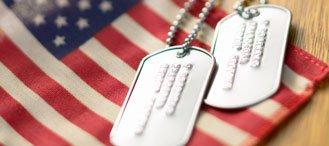AARP Hearing Center

A flanking maneuver is something Hank Povinelli, a military veteran, understands. For him and other AARP volunteers, the COVID-19 pandemic forced a pivot to digital solutions as they continue to reach out to South Carolina’s veterans.
Creative efforts to serve veterans online were “a silver lining to the pandemic cloud,” Povinelli, 73, of Fort Mill, said. “We found new ways to share information, like through telemedicine.”
In May of last year, Povinelli, a self-described “tech geek,” helped create the Virtual Volunteer Veterans Brigade. The program shares information and free AARP resources to support veterans in the areas of caregiving, avoiding fraud, transitioning to jobs, and connecting vets and military families to benefits. Volunteers share the information on their social media.
“We know there are veterans who don’t have a Facebook page, or even a computer,” Povinelli said. “But their caregivers do, their children, brothers and sisters, grandkids. It’s incredible how word can spread.
“We hope when we’re back in the face-to-face world, people will still recognize the value of online help,” he said.
Connecting in new ways
Reaching older vets is also a challenge for the state’s Department of Veterans Affairs.
“More than 180,000 of the 405,000 veterans in South Carolina are 65 or older,” said retired U.S. Army Major Gen. Will Grimsley, department secretary. At a November AARP telephone town hall, he said that veterans have struggled with depression during the pandemic.
One project stymied in the past year is the plan to build a Fisher House at Columbia’s Dorn VA Medical Center. Like a Ronald McDonald House, it would be a place near the hospital where visiting relatives could stay free while a loved one received care.
Friends of Fisher House Columbia has raised only a fraction of the $3.5 million needed for its share of the cost, though supporters still hope to break ground by early fall.
“A Fisher House in Columbia would serve tens of thousands of military families and caregivers and save them $500,000 annually in lodging costs,” said Joe Meyers, associate state director for AARP South Carolina.
VA hospitals plan to bring volunteers back slowly. “When we’re able, we’ll be there to support the veterans at the VA, serving however we can,” Meyers said. Another priority is reviving Stand Down events, which provide food, clothing, health screenings and job resources to homeless vets. Columbia’s event will probably be virtual in 2021.
A full Stand Down is planned for Charleston this fall. Myrtle Beach Stand Down organizers are cautiously planning a drive-through event, like last year’s.
Volunteer Jean Gillian, of Conway, had four brothers who all served in the military. Since 2014, she has cooked burgers, sorted clothing and packed supplies for the Myrtle Beach event.
“Veterans are really underserved,” she said. “Some need health care services; some are homeless.” Gillian intends to help out with this year’s Stand Down.
Povinelli, who served in the Army in Vietnam, said he appreciates hearing “Thank you for your service.”
For more information on AARP’s work with veterans and military families, visit aarp.org/veterans. Learn how you can help at aarp.org/volunteers.
Linda Lamb is a writer living in Columbia.
More on Veterans































































